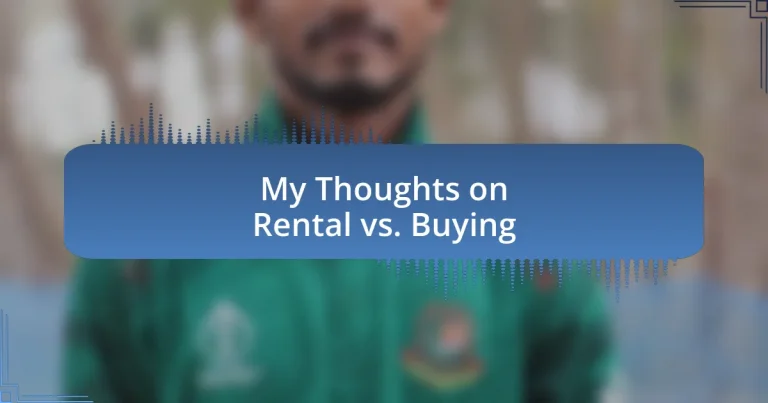Key takeaways:
- Renting offers flexibility and lower upfront costs, making it suitable for those in transitional phases of life.
- Buying a home allows for customization, equity building, and financial stability through fixed mortgage rates.
- Financial implications of renting include lack of long-term investment returns and absence of tax benefits, while buying can lead to wealth accumulation and appreciation in home value.
- Personal circumstances, stability needs, and market conditions significantly influence the decision between renting and buying.
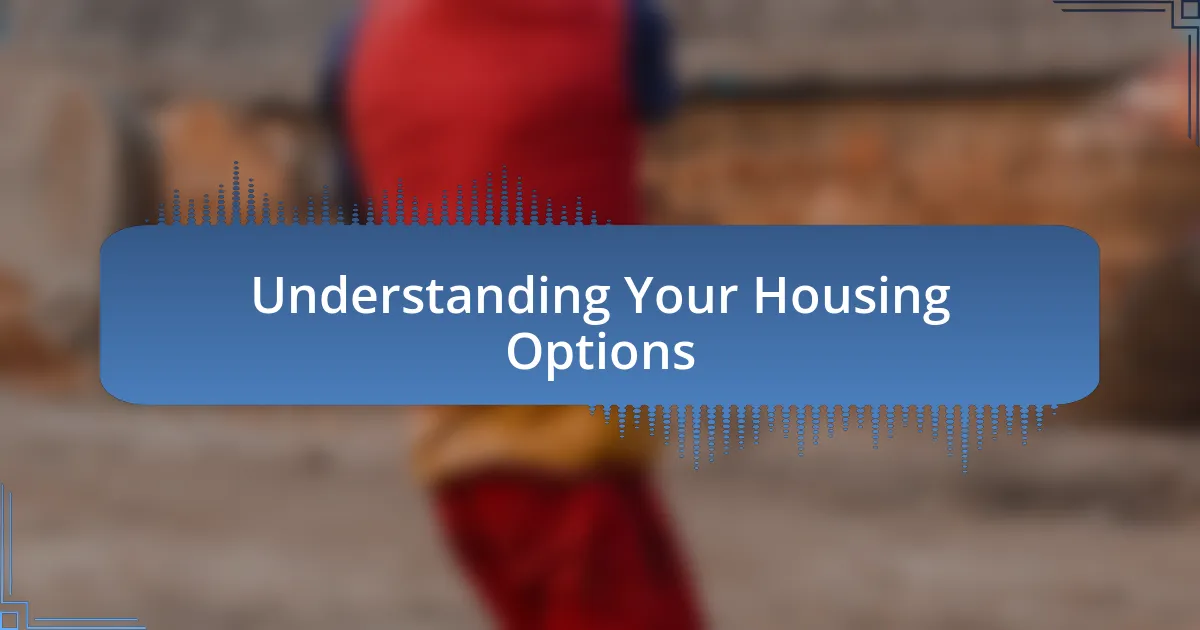
Understanding Your Housing Options
When considering your housing options, it’s important to reflect on your lifestyle and current situation. I remember a time when I was torn between renting and buying. I loved the idea of homeownership, but the flexibility of a rental seemed like a safety net during uncertain times.
Renting offers the advantage of mobility, which can be a huge asset, especially if you’re in a transitional phase of life. I found that during my first job, being able to move easily without worrying about selling a property allowed me to take advantage of great career opportunities. Have you ever felt the weight of being tied down? That sense of freedom can be exhilarating when it’s in your hands.
On the other hand, buying a home can feel like laying down roots in a community. There’s something deeply fulfilling about creating a space that reflects your tastes and values. I recall feeling a wave of pride when I painted my first living room—a small touch, but it made the place feel like mine. How do you envision your ideal living space? The emotional connection to a home can be a compelling reason to take that leap into ownership.
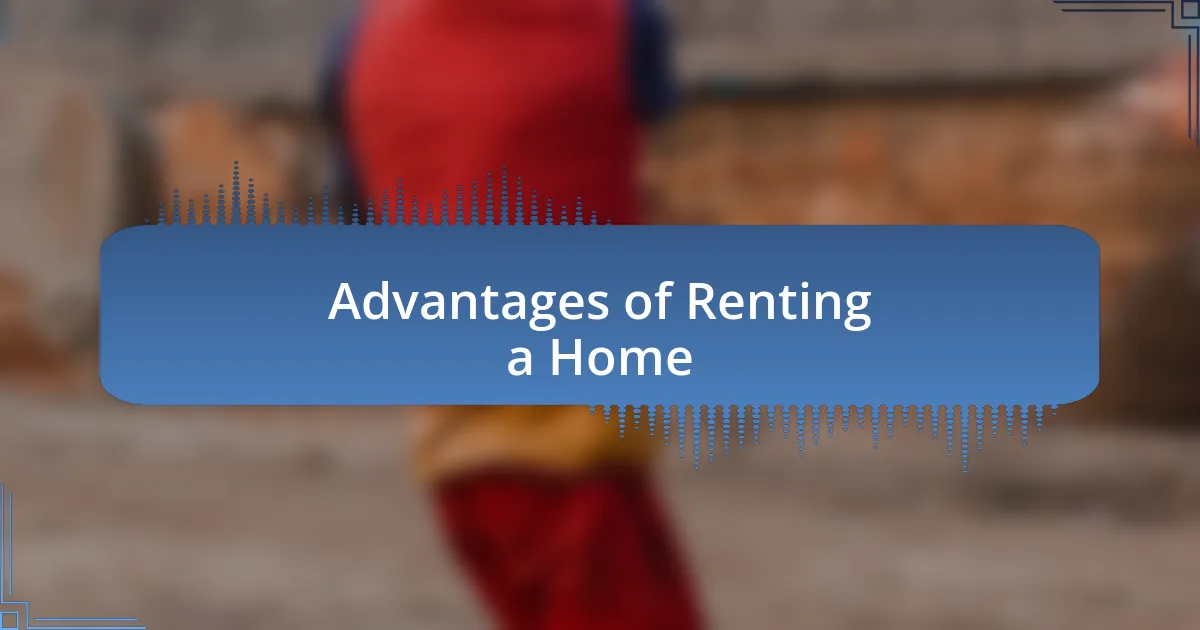
Advantages of Renting a Home
Renting a home brings a level of flexibility that many find appealing, especially if you value the ability to adapt to life’s changes. I remember when I relocated for a new job; being able to pack up and move without the burden of selling a property felt liberating. It made me realize that sometimes, the simpler option can lead to unexpected opportunities.
Here are some advantages of renting a home:
- Lower Upfront Costs: Typically, when renting, you only need to cover the initial deposit and the first month’s rent, unlike the hefty down payment required for buying.
- Maintenance-Free Living: Renters usually aren’t responsible for major repairs, which is a relief during unexpected situations.
- No Market Risk: The volatility of real estate markets doesn’t affect renters, allowing for peace of mind during economic shifts.
- Access to Amenities: Many rentals include amenities like pools or gyms without the extra costs associated with homeownership.
- Easier Relocation: If your career or personal life dictates a move, renting allows for a much quicker transition without the hassle of selling a house.

Benefits of Buying a Home
Buying a home often represents one of the most significant investments a person can make, and for good reason. When I bought my first home, it felt like stepping into a space that truly reflected my identity. Unlike renting, homeownership allows me to customize my living environment. Whether it’s painting walls or installing fixtures, every decision feels personal and fulfilling.
Moreover, buying a home is a pathway to building equity. Each mortgage payment contributes to ownership of a tangible asset, as opposed to throwing money away on rent. I recall how rewarding it felt to see my home value increase over the years, transforming an expense into a potential financial gain. This aspect can significantly enhance financial security and future wealth.
Lastly, owning a home can offer stability that renting simply doesn’t provide. The unpredictability of rental prices can lead to anxiety about future living expenses. I remember a friend who faced a steep rent increase and had to move unexpectedly, disrupting her life. In contrast, I find peace in knowing that my mortgage rate is locked in, giving me a predictable monthly expense.
| Benefits of Buying a Home | Details |
|---|---|
| Equity Building | Each mortgage payment contributes to owning your asset. |
| Customization | Your home reflects your style without restrictions. |
| Stability | Fixed mortgage rates offer predictability in payments. |
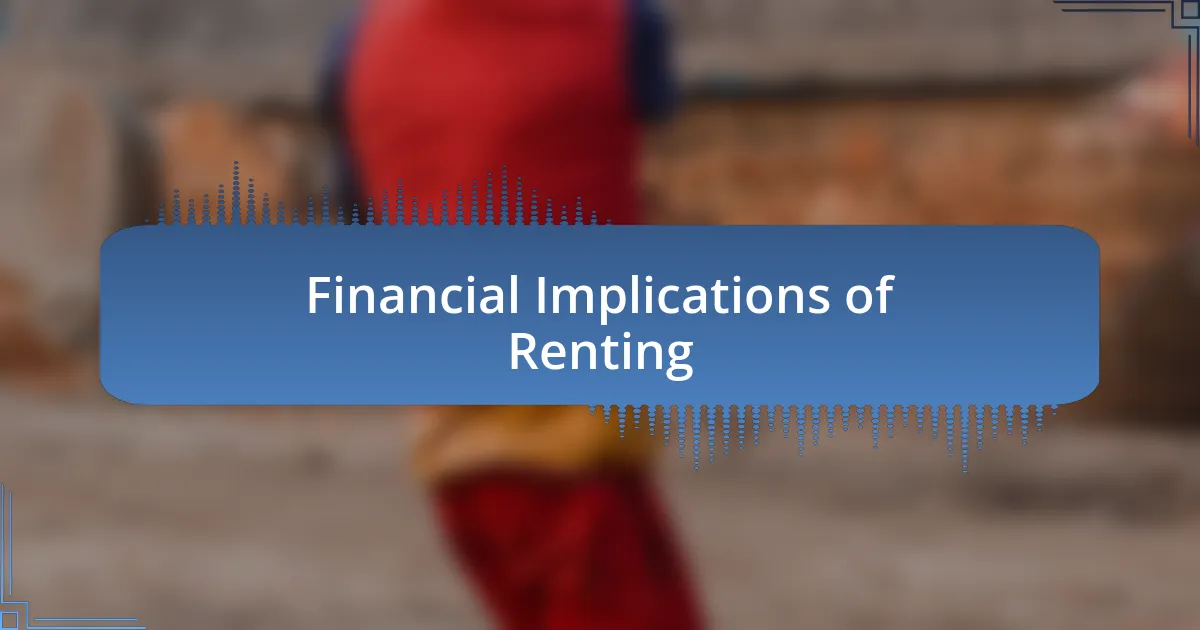
Financial Implications of Renting
Renting may seem like a flexible option, but the financial implications can add up quickly. Each month, the rent I pay feels like a constant drain on my budget, with no long-term return. Have you ever felt that pang of regret after writing a rent check, knowing that money doesn’t contribute to an investment?
Additionally, renting often includes unexpected costs that can take a toll on finances. For instance, I recall a year when my landlord decided to increase the rent significantly, leaving me scrambling to adjust my budget. It’s a reminder that while renting offers short-term flexibility, it can also come with the unpredictability of additional charges, from maintenance fees to utilities that often aren’t included in the rent.
Lastly, the lack of tax benefits associated with renting can be disheartening. Unlike homeowners, I don’t get to deduct mortgage interest or property taxes from my income. When tax season rolled around, I often felt envious of friends who could leverage their homeownership for financial benefits, making me realize that while renting offers immediate ease, it might not be the most advantageous financial decision in the long run.
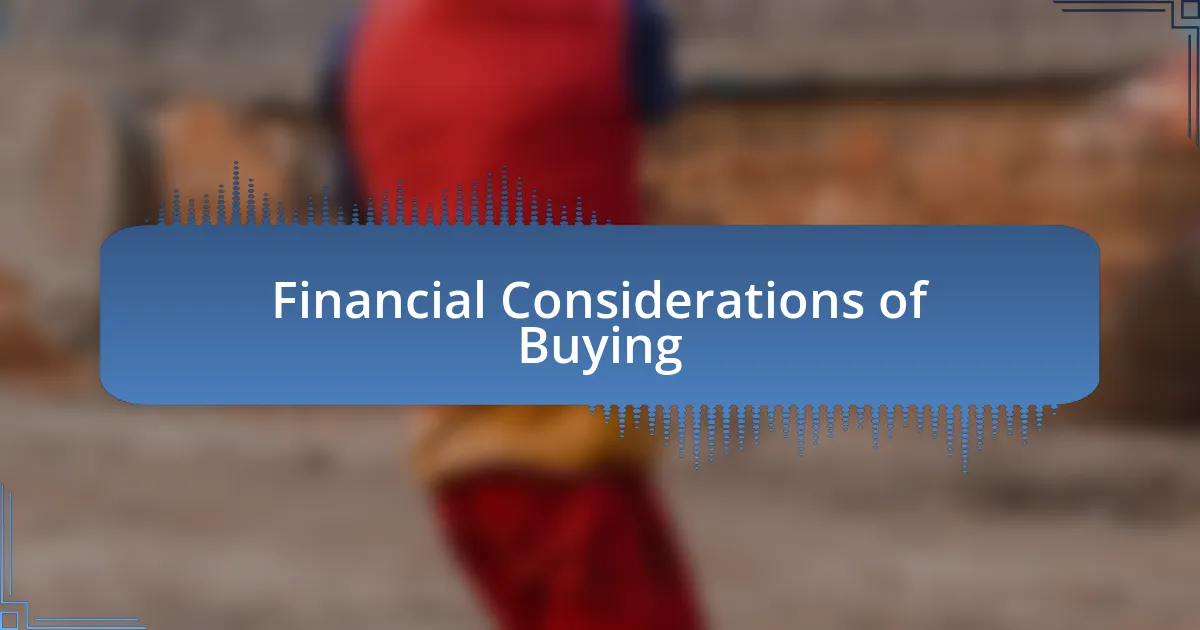
Financial Considerations of Buying
Buying a home can initially seem like a daunting financial commitment, but I’ve often found it offers a unique opportunity for wealth accumulation. When I made my first home purchase, I was surprised to discover that my monthly mortgage payment was often lower than my previous rent. Have you ever thought about how each mortgage payment chips away at the principal, effectively building equity instead of just lining someone else’s pockets?
Then there’s the matter of appreciation. In my experience, homes tend to increase in value over time. I remember when I sold my first house after a few years; the appreciation I gained was not just a cushion for my finances but a significant boost to my overall net worth. This potential for growth is a powerful motivator when considering the long-term benefits of buying over renting.
Another financial consideration is the advantage of tax deductions that come with homeownership. I distinctly recall the feeling of relief come tax season when I could write off mortgage interest and property taxes. That reduction in taxable income felt like a small reward for taking on the responsibility of homeownership. It’s these financial perks that made my decision to buy not just an emotional choice but a strategically calculated financial move.

Factors Influencing Your Decision
When weighing the decision between renting and buying, personal circumstances play a huge role. For instance, I remember a friend who faced a growing family and a need for more space. She realized that renting a larger apartment would cost significantly more than investing in a family home. Reflecting on my own experience, I’ve learned that understanding your current and future needs is vital.
Then there’s the matter of stability and lifestyle choice. After moving several times for work, I craved a sense of permanence, which ultimately influenced my decision to buy. Can you imagine waking up each day knowing you have a place to truly call your own? This feeling of stability can outweigh the flexibility that renting offers, and it’s something I really treasure in my life now.
Lastly, external factors like the housing market can’t be ignored. I recall the thrill of buying my home during a buyer’s market, forcing me to consider timing along with all other factors. Have you ever felt the weight of external circumstances on your decisions? That moment taught me that not only should you consider your personal situation but also the broader economic environment, as it can drastically affect your investment’s potential.
